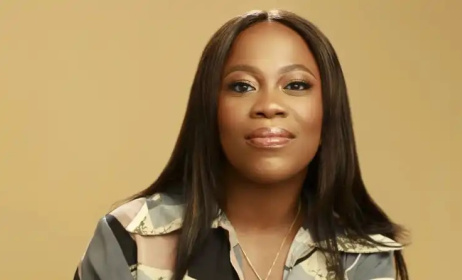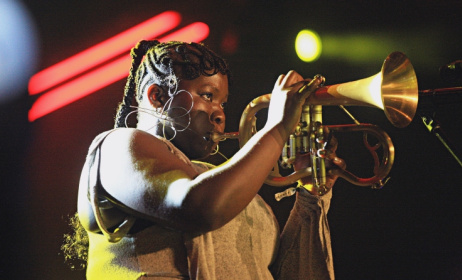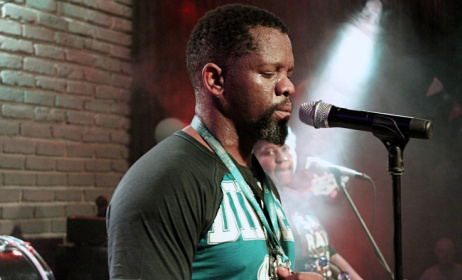6 takeaways from SAMAs 2022
This year’s South African Music Awards (SAMAs) were one of the most inclusive, unexpected and widely contested editions, with a surprising winners’ list defined by young artists with little fame. This seemed to enrage many South Africans, who often root for the familiar. Now that the naysayers have blown off some steam, we can jump to other key takeaways from the 2022 SAMAs and speculate about what the winner’s list could mean for the evolving music industry.
 Makhadzi criticised the SAMAs for being below-par in terms of production.
Makhadzi criticised the SAMAs for being below-par in terms of production.
1. It's fair game for all artists
You don’t have to be a big name to win big at the SAMAs. Of course, it is commonplace for competitive events at national level to attract public backlash – usually in the form of criticism, controversy or uninformed opinions – from artists, their representatives or fans whose high hopes were dashed by the final decision on the night. For instance, Haksul Musiq, who walked away with the highly contested SAMPRA Artist of the Year Award, incited many opinions when he beat out big names such as Emtee and A-Reece. Viewers were perplexed by the relatively unknown winner in a category determined by public voting. The rumour mill pinned the win on foul play. Whether this was true or not, the victory was a reminder about the importance of voting for your favourite artist.
2. Young artists are winning big
This year’s edition boasted the highest number of young nominees. This could be due to the growth of amapiano, which has ushered in a slew of new musicians. The introduction of the TikTok Most Viral Song of the Year Award – won by 9umba, TOSS and Mdoovar for their track ‘uMlando’ – also speaks to the key involvement of the youth in the music industry and how hits are made nowadays; young people are more likely to stream music online if the most streamed song is anything to go by. To provide some contrast here, the song with the most radio airplay was house hit 'Osama' by Zakes Bantwini featuring Kasango, from a genre that enjoys an older generation of fans compared to amapiano’s followers.
3. Small production issues can cause big problems
In the other non-public voting categories, Record of the Year went to ‘Vula Mlomo’ by Musa Keys featuring Sir Trill and Nobantu Vilakazi, while the Music Video of the Year Award was given to Limpopo star Makhadzi, who has made a name for herself as a sought-after live performer. But she did not make her way to the podium to accept her award despite performing moments earlier. The musician later blasted the SAMAs for being below-par in terms of production and said her appearance was riddled with issues such as unfair treatment during her limited rehearsal slot and sound sabotage during her performance.
4. Amapiano’s influence is still on the rise
Amapiano artists are increasingly winning big at award shows. The Record of the Year Award attests to this and so does the genre’s mass consumption in South Africa. More importantly, the eccentric sound continues to gain more respect as an art form, evidenced by Reece Madlisa and Zuma’s Ama Roto Vol 2 EP, which clinched the Best Duo/Group Award. And because amapiano has now become a highly collaborative space, with most songs boasting several featured artists, this category could become the home of the genre for the foreseeable future. Last year, the same category was also ruled by amapiano when Scorpion Kings Kabza De Small and DJ Maphorisa won for their album Once Upon a Time in Lockdown.
5. Will kwaito ever be bigger than amapiano?
If the answer to the this question is a resounding ‘no’, and the winner in the Best Kwaito Album category is consistently an amapiano album as the past two years have demonstrated, what is the reason for a new popular sound competing in an award category bearing the name of an outdated genre? Add to these two categories the Best Gqom Album Award, which recognises an ever-dwindling cohort of music makers, and one begins to question whether there shouldn’t be just one category that houses all three genres and their respective creators as was the case before 2020. (This year’s winners in the Best Kwaito Album category were Reece Madlisa and Zuma for their Ama Roto Vol 2 EP. The two artists won in the same category last year for the first Ama Roto EP release.)
6. The SAMAs should consider a ‘no show, no award’ caveat
The empty seats at Sun City’s Superbowl were disturbingly obvious due to a low turnout of award winners. Without the big stars, it becomes questionable whether you have put on the event you envisaged: fans and TV viewers watch these events to see their favourite celebrities; when they are nowhere to be seen, you change the channel. Photographers at the event also had a tough time when they were left with a limited number of subjects to shoot on the podium. Many of the absentees cited previous engagements like gigs for not being at the event. A paying gig is a paying gig, but the SAMAs, whether you like them or not, are a pretty big deal on the South African music calendar, so as an artist you should take a cut on one night of the year to not only satisfy your fans but also pay tribute to your fellow artists by showing face. Maybe the organisers of the SAMAs should instate a ‘no show, no award’ rule, but by doing this they could run the risk of losing even more award winners.
View the full SAMAs 2022 list of winners here.


































Comments
Log in or register to post comments